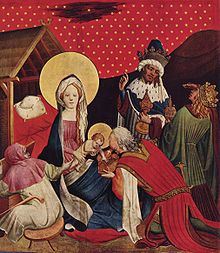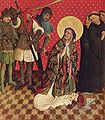- Master Francke
-
Master Francke, or Meister Francke, Frater Francke, respectively German for "Master Francke" and Latin for "Brother Francke", was a North German Gothic painter and Dominican friar, born ca. 1380 in the Lower Rhine region or possibly Zutphen in the Netherlands, who died ca. 1440, probably in Hamburg, where he was based at the end of his known career. He is called "Fratre Francone Zutphanico" ("Brother Frank of Zutphen") in one document.[1] He may have trained as an illuminator and painter in France or the Netherlands, and later worked in Münster, before joining in St John's Friary in Hamburg by 1424 at the latest.[2]
Two main altarpieces attributed to him survive, dedicated to St Thomas of Canterbury and Saint Barbara, in an unusually intense style, showing awareness of French and Early Netherlandish court art. He probably arrived in Hamburg after the death in 1415 of the previous leading artist there, Master Bertram, and shows little or no influence from him, but he may have been influenced by the more courtly style of Conrad von Soest, about ten years older than Francke, who worked to the south in Westphalia.[3]
The Hamburg association of traders to England commissioned an altarpiece from "Mester Francke[nn]" in 1424; the contract does not survive, but is mentioned in their memorial book. This is probably the "St Thomas (of Canterbury) Altarpiece", completed in 1436, of which parts survive in the Kunsthalle, Hamburg.[4] The rather earlier St Barbara Altarpiece may have been commissioned for Finland, where it surfaced a century ago. The "Thomas Altar" has eight surviving scenes, but is missing its main panel and several others. The "Barbara Altar" has also eight scenes, on both sides of the wings to a carved wood central panel by another artist. At least two other panels are in museum collections.[2] Francke was almost entirely forgotten after the Renaissance until the end of the 19th century when, like Master Bertram, he was rediscovered and published by Alfred Lichtwart, Director of the Hamburg Kunsthalle.[5]
Gallery
-
Resurrection of Jesus (ca. 1424)
Notes
- ^ The identification of the monk and the master has been disputed, but now seems widely accepted. For the contrary arguments see Châtelet, pp. 22-25
- ^ a b Hutchison
- ^ Emmerson
- ^ Judgment and nameform from Grove Art Online "Master Francke", by Hans Georg Gmelin; the name is attested in the dative.
- ^ Kay, Carolyn Helen (2002). Art and the German Bourgeoisie: Alfred Lichtwark and Modern Painting in Hamburg, 1886-1914. University of Toronto Press. p. 18. ISBN 0802009220. http://books.google.co.uk/books?id=v6y6rk1mYOUC&pg=PA18&dq=Meister+Bertram&lr=&as_brr=3&sig=ACfU3U2-T-BKCyngaO68_Z1Hnvq2QqZo0w.
References
- Friedrich Wilhelm Bautz (1990). Bautz, Friedrich Wilhelm. ed (in German). Francke, Meister (Frater Francke). Biographisch-Bibliographisches Kirchenlexikon (BBKL). 2. Hamm. cols. 90–91. ISBN 3-88309-032-8. http://www.bautz.de/bbkl/f/francke_me.shtml.
- Châtelet, Albert (1980). Early Dutch Painting, Painting in the northern Netherlands in the fifteenth century. Montreux, Lausanne. ISBN 2882600097.
- Key Figures in Medieval Europe: An Encyclopedia, By Richard Kenneth Emmerson, Sandra Clayton-Emmerson, CRC Press, 2006, ISBN 0415973856,
- Course notes by Jane Campbell Hutchison. Short descriptions of some works
Categories:- 1380s births
- 1430s deaths
- German painters
- Gothic painters
- Dutch painters
- People from Hamburg
- People from Zutphen
Wikimedia Foundation. 2010.





